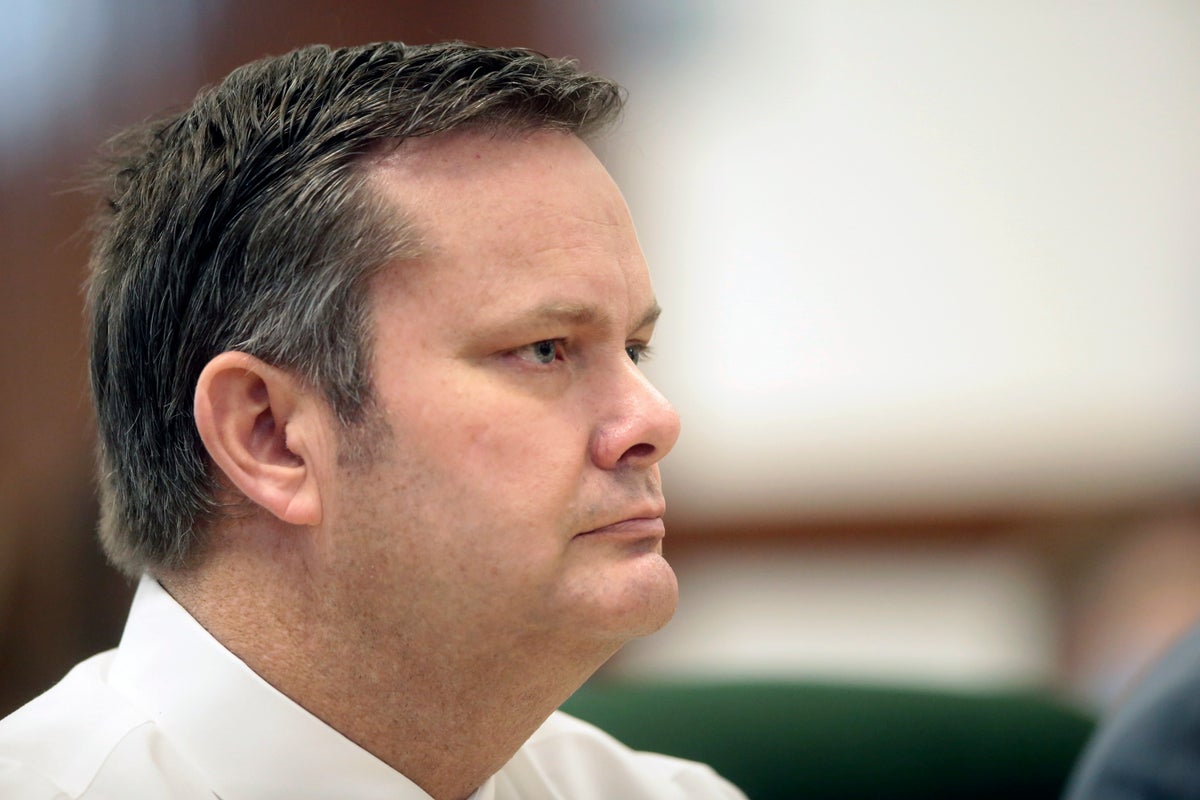
An Idaho judge has ruled that Chad Daybell’s upcoming murder trial will be livestreamed, following requests from the defence and several media outlets to broadcast the proceedings.
Judge Steven Boyce made the decision made the ruling Wednesday morning after hearing arguments from the state, Mr Daybell’s attorney and an attorney representing local media outlets, amending his previous camera ban that was put in place last year.
Cameras will be allowed in the courtroom for the duration of the alleged cult leader’s highly-anticipated trial, which is set for 1 April 1 2024 and expected to last eight to 10 weeks. There will be restrictions, however, as Judge Boyce decided that the trial will be streamed through the court’s cameras, not the media.
On Wednesday, an expressionless Mr Daybell sat completely still at the defence table with his attorney John Prior, who filed the motion last year requesting cameras in the courtroom.
“Cameras keep everybody honest,” Mr Prior said in court on Wednesday. “It keeps the system honest. It keeps the witnesses honest. It keeps everyone honest.”
Mr Daybell faces murder charges in the deaths of Lori Vallow’s children, Tylee Ryan and JJ Vallow, and his former wife, Tammy Daybell. Fremont County and a motion to move the death penalty off the table.
Chad Daybell’s booking photo in 2020— (Rexburg Police Department via AP)
Judge Boyce previously denied the request for cameras in the courtroom when Mr Daybell and Vallow’s cases were joined. The cases were later severed, and the judge scheduled Wednesday’s hearing to revisit the issue.
He said Mr Prior made a compelling argument for the cameras - noting that having cameras would allow family members to watch off-site.
"The primary reason Mr Daybell wants cameras in his trial is for his family to watch the proceedings,” Mr Prior said. “They’d like to be able to view it.”
Judge Boyce agreed and told the court: “The difficulty of moving a trial 350 miles from where we are certainly creates restrictions on individuals who would like to attend.”
The defence also requested the trial be streamed through the media, citing technical issues with the court’s system.
“A public trial is just not limited to people coming from Fremont County to watch the proceedings,” Mr Prior said. “There were issues with the live feed (to an overflow room in Lori’s case ). It wasn’t pragmatic. Let’s use the professionals who know how to do this.”
But Judge Boyce ruled the trial would be streamed on the court’s system.
Earlier this year, Vallow’s gruelling six-week trial was held at the Ada County Courthouse without cameras. Only the verdict was allowed to be livestreamed through the judge’s YouTube page.
Prosecutors argued to keep the camera ban order in place, to match Vallow’s trial, and argued that cameras in the courtroom could turn a case which has already received massive amounts of media attention into a “circus.”
“I don’t think it’s a good thing to turn everyday life into a circus,” prosecutor Rob Wood said. “I think broadcasting, even if it’s done respectfully, will do that.”
During his argument on Wednesday, Mr Wood cited concerns over tainted jury pools and issues with witnesses potentially watching live streams.
“We don’t have to put cameras in people’s faces for the trial to be open, transparent and public,” he said. “We believe strongly that having live broadcasting this trial only makes it more difficult to get to the truth.”
“We shouldn’t fix what isn’t broken,” Mr Wood added. “This court made a very good decision (banning cameras). We think the court correctly made the decision and it led to more professional proceedings and helped in preserving the rights of the party to a fair trial.”
But ultimately Judge Boyce made the decision to allow cameras, but only through the court, which will broadcast the video and audio feeds on the court’s website. He also said that he would not allow still photography or microphones in the courtroom from any media outlet or third party.
Judge Boyce also heard arguments on several pending motions that could possibly change the circumstances of the upcoming trial, including a motion to move the proceedings from Ada County, where Vallow’s trial was held, to the smaller Fremont County.
Mr Daybell’s attorney Mr Prior also filed a motion asking to strike the death penalty as a possible punishment and cited Vallow’s case.
He argued that Daybell and Vallow were charged with the same crimes, so it would be unconstitutional for them to face different levels of punishment.
Judge Boyce, who also presided over Vallow’s trial, had removed the death penalty from her case because prosecutors failed to turn over discovery evidence in a timely manner.
The judge will issue written rulings on both at a later date.
Lori Vallow Daybell stands and listens as the jury’s verdict is read at the Ada County Courthouse in Boise, Idah— (Copyright 2023 The Associated Press. All rights reserved.)
Vallow married Mr Daybell in November 2019 less than two weeks after his wife Tammy died of what was initially labeled as natural causes. Her body was later exhumed and it was determined she died of asphyxiation.
The case drew nationwide attention when Vallow’s children went missing in September 2019. While they were still unaccounted for, Vallow was on a beach in Hawaii marrying the self-proclaimed religious leader.
Nine months later, the children’s bodies were found buried in shallow graves Mr Daybell’s backyard in June 2020.
Both Vallow and Mr Daybell were both charged with murder and conspiracy in the death of her children and conspiracy to kill Tammy. Vallow received three life sentences. Daybell faces the death penalty if convicted.
Vallow also faces two conspiracy to commit murder charges in Arizona in the death of her fourth husband, Charles Vallow. However, the Maricopa County Sheriff’s Office said she wouldn’t be extradited until after the appeals process plays out in Idaho.







